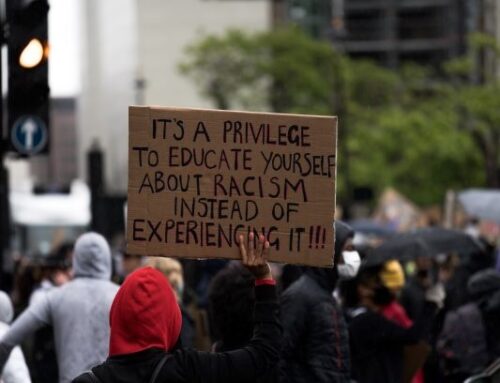
I recently expressed to a good friend of mine, who is Black, my heartbrokenness over yet another Black man being slain by police. My friend asked me, “I wonder if your heartbrokenness will ever shift to outrage?”
What a thought-provoking question that has turned out to be. As I have tried to honestly probe my thinking and feeling about the question, one of the first things I have realized is that outrage is an emotion I seldom experience. I am just not a person that gets “outraged” very often. I generally don’t think of outrage as being a very useful, practical, or helpful emotion. So I try to avoid it.
But what I really think my friend was asking was, “How much heartbrokenness do you have to experience before you will actually do something to make a difference or speak out against the things that break your heart?” I think that is also a very fair and thought-provoking question.
A couple of years ago, I got sufficiently upset about the treatment of immigrants on our southern border that we engaged a group at church to discuss how we could respond. It was a good experience. We did some big and some little things and made at least a small difference. So what was it about those circumstances that finally made me act? Part of the answer was continually hearing that “silence is consent.” That not speaking out, not acting, not doing anything, gave power to the oppressors. I could be silent no longer.
Honestly, I think that is happening to me again in our current situation of increased awareness of systemic racism and the many ways we (often blindly) support that oppression. I am learning much in my reading and listening and discussing and that is a first step. But it can’t be the last step. My learning must result in a change of behavior. I need more friends, especially friends of color, who will challenge me with questions such as the one above. I need to be discussing my learning and listening with others as we are doing in our church’s Difficult Discussions on Racism group. That group is, among other things, thinking of ways that we can make a difference, in our families, our churches, and our communities. However, I know it is going to take more than listening, discussing, reading, and thinking. A recent article I read quoted Chicago pastor David W. Swanson, “White people tend to think that the answer to racial injustice is to foster cross-racial friendships, while POC [people of color] are often, in my experience, looking for friends who will join the struggle for genuine equity.” For me, listening and learning and reading and discussing are really important. But those things must absolutely lead to changed behavior. They must lead me to join the struggle for genuine equity. I pray that the Spirit will continue to work in me, through my friends and through my learning, to move me to step out, risk discomfort, and truly make a difference.
What are you doing to make a difference…or to at least prepare yourself to make a difference? When will your heartbrokenness lead to action?
The grace of our Lord Jesus Christ,
the love of God,
and the communion of the Holy Spirit
be with you all.
God bless,
Coe




I will join the conversation, and I also ask for accountability and grace as I learn so much. Prayers and gratitude dear Coe.
Its a joy to journey together and I need you, and others, to hold me accountable as well. Bless you!
Coe this is a great post – challenges me to think about what we are doing too.
Thanks Christine, it is fun to get the blog going. Thanks for all the support and encouragement.
Yes, when protest moves to policy we will be making a real lasting difference. I wonder what you are reading? I have read What Makes White People Uncomfortable, by Michael Bennett and now have When they Call you A Terrorist by Patrisse Khan-cullors and Just Us an American conversation by Claudia Rankine.
I so appreciate having this conversation. Cathy
Sounds like a great reading list, Cathy. I have read, So You Want to Talk About Race by Ijeoma Oluo, and Dear Church by Rev. Lenny Duncan, and A House United by Allen Hilton. Also some excellent YouTube videos:
P&G Ad – The Talk
P&G Ad – The Look
Let’s #TalkAboutBias: A Social Experiment by P&G
Deconstructing White Privilege with Dr. Robin DiAngelo
Let’s Get to the Root of Racial Injustice-Megan Ming Francis-TEDxRainier
There is a special on PBS on Tuesday, Oct. 13 at 9:00 titled Driving While Black that looks good.
https://www.pbs.org/show/driving-while-black/
Thanks for the comment and conversation–there is more to come.